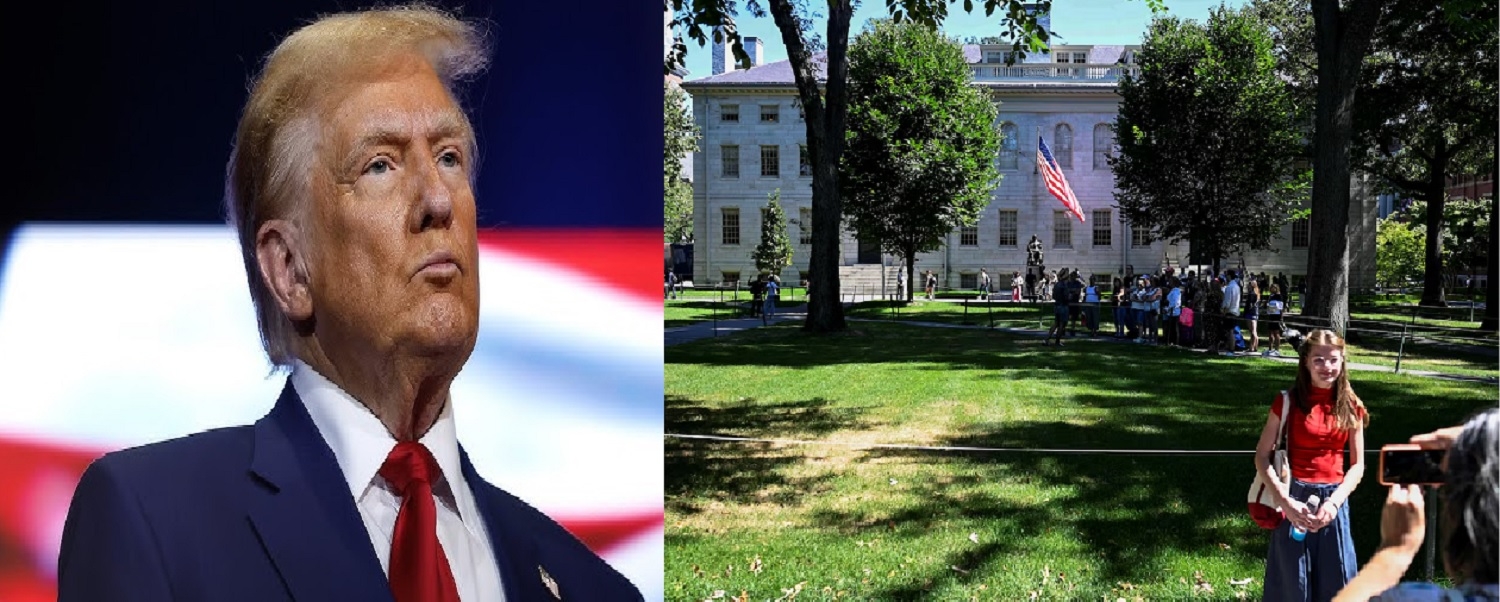Trump adds another threat as Harvard fails to comply with US demands
Total Views |

- The Trump administration's requests are rejected by Harvard as unlawful and illegal.
- Some intellectual freedoms, according to Columbia, are "not subject to negotiation."
- Princeton and Stanford officials express support for Harvard
NEW YORK, April 15 :- A day after Harvard rejected what it described as illegal demands to restructure academic programs or lose federal money, U.S. President Donald Trump threatened to revoke the university's tax-exempt status on Tuesday and said it should issue an apology.
The Trump administration has criticized colleges nationwide, starting with Columbia University, for how they handled the pro-Palestinian student protest movement that erupted on campuses last year in the wake of the Israeli airstrikes on Gaza and the 2023 Hamas-led attack within Israel.
In addition to accusing universities of promoting Marxism and "radical left" ideology, Trump has dubbed the protests anti-American and antisemitic and pledged to terminate federal money and contracts to academic institutions that disagree with his administration's demands.
In a social media tweet on Tuesday, Trump said that if Harvard persisted in promoting what he described as "political, ideological, and terrorist inspired/supporting 'Sickness,'" he may try to revoke the university's tax-exempt status.
He did not specify how he would go about doing this. The majority of colleges are considered to be "run exclusively" for public educational purposes, which exempts them from federal income tax under the U.S. tax code.
Karoline Leavitt, the White House press secretary, told reporters that Trump wanted Harvard to issue an apology for "antisemitism that took place on their college campus against Jewish American students."
She charged Harvard and other universities of breaking Title VI of the Civil Rights Act, which forbids racial or national origin discrimination by those who receive government funds.
Columbia and Harvard have not complied with Title VI, which requires a thorough investigation, hearings, and a 30-day notice to Congress before federal money can be canceled.
According to several academics and students, the demonstrations are being falsely associated with antisemitism as a cover for an unconstitutional assault on academic freedom.
After the Trump administration said last month that it had canceled funds and contracts totaling $400 million, primarily for medical and other scientific research, Columbia, a private school in New York City, agreed to talks over requests to strengthen its protest regulations.
In a letter on Monday, Harvard President Alan Garber claimed that the Trump administration's demands of the Massachusetts university, which included ending diversity, equity, and inclusion programs and conducting an audit to guarantee the "viewpoint diversity" of its faculty and students, were unprecedented "assertions of power, unmoored from the law" that infringed on the Civil Rights Act and the Constitution's guarantee of free speech.
He claimed that Harvard, like Columbia, had made efforts to combat antisemitism and other forms of discrimination on campus while upholding academic freedoms and the right to demonstrate.
The Joint Task Force to Combat Anti-Semitism of the Trump administration announced hours after Garber's letter that it was freezing over $2 billion in grants and contracts to Harvard, the oldest and wealthiest university in the nation. Harvard did not reply to a request for comment, and the administration did not answer inquiries regarding whose contracts and funds had been canceled.
The Trump administration has been sued by a few Columbia academics who claim that the grant terminations violated their constitutional rights to free expression and due process as well as Title VI. The Trump administration was ordered to respond by May 1 by a federal judge in New York.
Columbia's interim president, Claire Shipman, said in a statement Monday night that the university will continue "constructive engagement" and "good faith negotiations" with the U.S. Justice Department's antisemitism task force after reading the Harvard president's letter.
In her letter, she stated, "We would reject any deal in which the government directs what we teach, research, or who we hire."
SUPPORT FROM OTHER SCHOOLS
On Tuesday, several of Harvard's peer universities endorsed the university's opposition to the Trump administration.
On social media, Princeton University President Christopher Eisgruber posted, "Princeton stands with Harvard," urging readers to read the Harvard president's critique of the demands of the government.
In a statement, provost Jenny Martinez and president Jonathan Levin of Stanford University declared their unwavering support for Harvard.
The two stated, "Harvard's objections to the letter it received are rooted in the American spirit of liberty, a tradition required of our nation's universities and worth maintaining."
They went on to say that although academic institutions must "address valid issues with humility and openness," it is evident that "damaging the nation's ability for scientific inquiry is not the way to bring about constructive change."
A U.S. judge declared she would not hold the Trump administration in contempt of court for the time being, citing no proof that the administration attempted to gain the return of a man who had been wrongfully deported to El Salvador.
The Trump administration suffered a new legal defeat in its campaign against companies he disapproves of when a judge in Washington rejected the majority of his executive order targeting the law firm Susman Godfrey. After Trump started targeting the legal sector, Judge Loren Ali Khan pointed out that a number of other firms had struck deals with him. She expressed her wish that they were not "capitulating" to what she saw as government coercion. As Trump reduces federal funding to universities and revokes foreign student visas, more American students are applying to Canadian universities or expressing interest in studying north of the border.

